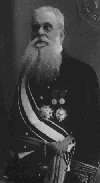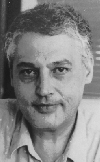D. Ricardo Codorníu was a pioneer in Murcia, Spain, and in Europe on
what it is called today Ecology. But he was not so because of
his remarkable condition of Forest Engineer: to achieve that it was
necessary that spark which turns the few into the excellent. and Don
Ricardo had that spark, consequence of meditation. He understood
perfectly the importance of environment to man, and that looking after
it and caring for it was the sine qua non condition for human
survival. This was the consideration which led him to his great work:
the reforestation of Sierra Espuña, the lung of Murcia which we
all enjoy today. That is the reason why he is known as the Apostle
of the tree. When en 1888 and 1889 in England and Germany the
first association for the protection of birds were created, Ricardo
Codorníu was already working on Ecology en Murcia.
There is a second remark, consequence of the previous one: a person
who looks after the habitat of man is somebody who believes in man, and
this was his humanist condition. But a humanist which reflects on other problems of man, and Don Ricardo
did reflect on the most evident, that of lack of linguistic
understanding: a high wall which keeps people apart since the bible
times of Babel. And no sooner said than done: in the same way as he
reached the conclusion that tree is important and so he reforested
Sierra Espuña, regarding the linguistic problem he did the same: he set
on work and introduced the International Language Esperanto in Spain to
leap over the giant wall created by particular languages. This is the
reason why he is also known as the father of Spanish esperantism.
But a humanist which reflects on other problems of man, and Don Ricardo
did reflect on the most evident, that of lack of linguistic
understanding: a high wall which keeps people apart since the bible
times of Babel. And no sooner said than done: in the same way as he
reached the conclusion that tree is important and so he reforested
Sierra Espuña, regarding the linguistic problem he did the same: he set
on work and introduced the International Language Esperanto in Spain to
leap over the giant wall created by particular languages. This is the
reason why he is also known as the father of Spanish esperantism.
Here he created the first Esperanto groups in Spain (in Murcia,
Águilas, Lorca, Cartagena, Los Dolores, etc.) ON the 1st of September,
1902, the esperantists gathered to found the Esperanto Society,
and in February of 1903 those in Murcia and Valencia met in the former
to found the Spanish Society for the Propaganda of Esperanto,
being don Ricardo Codorníu nominated their president. The Society had
its official see in Murcia, Paseo del Malecón, letter C.
In Spain Don Ricardo founded and published regularly different
magazines: Vaga Stelo (Wandering Star) for foreigners; Hispana
Stelo (Spanish Star), for Spaniards; Murcia Stelo (Murcia
Star), for Murcia esperantists; and Arbara Stelo (Forest Star),
for forest engineers. Codorníu's stars were soon famous, both in Spain
and outside our country: it was the romantic constellation of the most
learned and charming idealists in the Esperanto Movement.
In the Summer of 1905 it was held the First World Congress of
Esperanto in France, where Mr. Codorníu was nominated adviser at the
Council for Linguistic Affairs, and he was sitting at the side of Dr.
Zamenhoff.
In 1905 the Murcia Association started publishing their own magazine,
the Hispana Esperantisto (the Spanish Esperantist), under the
direction of Mr. Manuel Benavente. This magazine appeared as the central
pages in the weekly Murcia, devoted to science, art and
literature, and the see of which was at 14, Sociedad Street in our city.
They also wrote at the newspapers La verdad (the truth),
El Liberal and El Eco de Cartagena (the echo of
Cartagena).
In 1907 Mr. Carlos Roca was nominated as President of the Cartagena group,
and in this city they started to teach Esperanto courses at the Economical
Society, at the Center of General Studies, in the Four Saints School, and
at the quarters of Santa Lucía and Los Dolores.
Perhaps the most important thing happened in 1909 on the occasion of
the 5th Universal Esperanto Congress in Barcelona. The presidency of
honor was accepted by the King of Spain, Don Alfonso XIII, and the
Committee was formed by the Rector of the University and the Mayor of
Barcelona. Don Ricardo Codorníu communicated officially that the King
had nominated Comendador and given the Collar of the Order
Isabel la Católica Dr. Zamenhoff. And two years later, in 1911, he also
reported that by Royal Order D. Alfonso XIII granted Esperanto the
condition of Language of Merit in the Spanish State. This very
same day D. Ricardo Codorníu published two works: The Importance of
Adopting an Auxiliary Language and How the International
Language will Influence in the Progress of Agriculture, Industry and
Commerce.
After a search of several I have got from the Netherlands the book
published by General Julio Manglada Stöaut;ner and titled Pri
Murcia. Kantaro de Murcia (About Murcia. A songbook of
Murcia). In the prologue, General Manglada includes honors the humanist
D. Ricardo Codorníu with a poem, which ends like this:
Men, birds and plants
we all in firm union
must thank his praxis,
his effort and illusion
for a fairer Mankind
of dialogue and understanding
I know perfectly that this is not the language of today. It is the
language of the end of the XIXth and beginning of the XX th centuries.
It is the language of Tolstoy and the great idealists who believed in
Man.. Today's language is inflation, the price of money, I+D and
that of competitis in every corner. But it is not due to the years
already gone by: it is because there are no ideas, and when ideas halt,
the language of money appears.
There is no questions about that the Group of Esperanto Ricardo
Codorníu is the oldest cultural association in Murcia, since when in
1902 it had its see in the Paseo del Malecón, letter C. Of course, it
was not a folklore-sports-cultural one, but cultural and intellectual in
its strict mean.
When today we see the European Union being built and it is settled up
the great problem of language diversity which, with all its crudeness,
prevents the integration of the member states, a hundred years before
Ricardo Codorníu said how it was to be solved: Every people with
their language, and Esperanto —super national— for every one. This
reflection is a self evident truth, obvious, it is the Columbus' egg
which many people still fail to understand.
It is still surprising that the name of Codorníu and his work have
been silenced with obstinacy by those who should have kept his name and
work alive as an example for future generations. Hence it is not
surprising the fact that Murcia gave the name of a park after a person
who has nothing to do with Murcia, like Mr. Camilo José Cela, while Don
Ricardo Codorníu is relegated to the most unfortunate obscurity from
those who owe him most: the Murcian people.
I finish my talk saying that D. Ricardo Codorníu's two passions,
ecology and Esperanto, passions disregarded as utopias by the
majority, were put in practice by this genial man, shown that the utopias
are real when you believe in them and that it is not enough
talking and talking —a common practice nowadays—, but devoting your
efforts in body and soul to the problems which mankind has still to
solve.
Be it a complement of the great book The Old Tree (El viejo
árbol) by my friend Enrique Morales, and as a homage to the hundred and
fifty years of the birth of Don Ricardo, the 55 Spanish Esperanto
Congress which will take place in Murcia on next July, and the presence
two months ago in this very same Culture Chamber of CajaMurcia
of the Nobel Prize of Economics of last year, the
German Professor Reinhardt Selten, who said his speech in Esperanto.
Undoubtedly D. Ricardo Codorníu would have celebrated it
enthusiastically.
Thank you.
Click this to go back.
 As
the Delegate of the Universal Esperanto Association and on behalf of the
Ricardo Codorníu Association, from Murcia, I would like to state
two comments about this significant Murcian whose importance is out of
questions both in national and international grounds.
As
the Delegate of the Universal Esperanto Association and on behalf of the
Ricardo Codorníu Association, from Murcia, I would like to state
two comments about this significant Murcian whose importance is out of
questions both in national and international grounds.  But a humanist which reflects on other problems of man, and Don Ricardo
did reflect on the most evident, that of lack of linguistic
understanding: a high wall which keeps people apart since the bible
times of Babel. And no sooner said than done: in the same way as he
reached the conclusion that tree is important and so he reforested
Sierra Espuña, regarding the linguistic problem he did the same: he set
on work and introduced the International Language Esperanto in Spain to
leap over the giant wall created by particular languages. This is the
reason why he is also known as the father of Spanish esperantism.
But a humanist which reflects on other problems of man, and Don Ricardo
did reflect on the most evident, that of lack of linguistic
understanding: a high wall which keeps people apart since the bible
times of Babel. And no sooner said than done: in the same way as he
reached the conclusion that tree is important and so he reforested
Sierra Espuña, regarding the linguistic problem he did the same: he set
on work and introduced the International Language Esperanto in Spain to
leap over the giant wall created by particular languages. This is the
reason why he is also known as the father of Spanish esperantism.